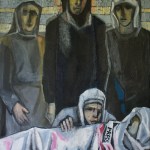
Abed Abdi is one of the most prominent figures in contemporary Palestinian art. Born in 1942 in Haifa, Palestine, Abdi experienced the traumatic events of exile and loss, themes that have been central to his work throughout his career. After the Nakba of 1948, which led to the mass displacement of Palestinians, he fled his hometown and settled in Lebanon with his family, where he spent much of his childhood and youth.
His art is deeply rooted in the political events that have shaped the modern history of the Palestinian people. The artist explores themes of Palestinian identity, exile, uprooting, but also resilience and hope. His work stands as a testimony to the suffering of the Palestinian people, but also to their unyielding will to resist and rebuild.
One of the major characteristics of Abdi’s art is his ability to blend traditional Arab and Palestinian artistic elements with contemporary forms, giving his creations a universal dimension.
In his paintings and sculptures, Abdi draws on elements of traditional Arab art, such as Arabic calligraphy and geometric patterns, which he reinterprets with a modernist vision. This fusion of old and new styles reflects the evolution of Palestinian culture and the resistance to the erasure of its history.
One of his most iconic works is a series in which he represents human silhouettes, often of women, with symbolic elements such as weapons or traditional accessories. These figures are seen as metaphors for strength and perseverance in the face of adversity.
Abed Abdi has also played an important role in promoting Palestinian art internationally, and his work has been exhibited in numerous prestigious museums and galleries around the world.”
https://lnkd.in/dPk2DqSn
19 DECEMBRE 2024 – Paris MILLON-DROUOT – STARTING AT 16 : 00
E-catalogue en bio

Tempera on paper, 24 x 32 cm

Acrylic on canvas, 110 x 90 cm





















